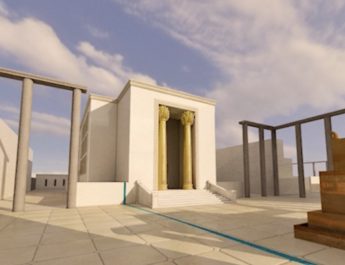Psalm 37:1-9
Ordinary C45
Of David.I
1 Do not fretII because of the wicked;III
do not be enviousIV of wrongdoers,V
I “David” = david. From the same as dod (beloved, love, uncle); the root may mean to boil, which is used figuratively to describe love. So, this implies someone you love such as a friend, a lover, or a close family member like an uncle. David’s name likely means something like “beloved one.”
II “fret” = charah. Perhaps related to charar (to be hot, burn, glow, melt, be scorched; figuratively, to incite passion, be angry). This is to be displeased, burn with anger, glow, become warn. Figuratively it is a blaze of anger, zeal, or jealousy.
III “wicked” = ra’a’. This is to be evil, bad, afflict. Properly, it means to spoil – to destroy by breaking into pieces. Figuratively, it is to cause something to be worthless. It is bad in a physical, social, or moral sense – something that displeases, does harm or mischief, punishes or vexes.
IV “be envious” = qanah. From qinah (zeal, jealousy). This is to be zealous or to provoke to jealousy.
V “wrongdoers” = asah + evel. Literally “those who do evil.” Evel is perhaps from aval (to deal unjustly, act in a wrongful way, a wrongdoer). This is injustice, wrong, moral evil, acts of violence, or unrighteousness.
2 for they will soonVI fadeVII like the grass,VIII
and witherIX like the greenX herb.XI
VI “soon” = meherah. From mahar (being liquid, which implies flowing; hurrying forward, whether in a positive or negative sense). This is speed, quickly, shortly, promptly.
VII “fade” = namal. 5x in OT. From the same as mul (to cut off, destroy, blunt, or circumcise). This is to cut down, language, circumcise, wither, or fade.
VIII “grass” = chatsir. Perhaps from the same as chatsir (village, settlement); from chatser (enclosure or court – a yard that is fenced in. It could also be a village or hamlet that is walled in); from chatsar (to blow a trumpet, trumpeter, to surround); from chatsotsrah (trumpet). This is grass, plant, hay.
IX “wither” = nabel. This is to fall away, faint, wither, languish, sink. Figuratively, it can mean being senseless, foolish, or wicked. Further, it can be to despise, disgrace, or fall to nothing, to be seen with contempt.
X “green” = yereq. 6x in OT – including “every green plant for food” from Genesis 1:30. Perhaps from yaraq (to spit). This is something green. It could be pallor or some kind of vegetation.
XI “herb” = deshe. 15x in OT- including “vegetation” from Genesis 1:11-12. From dasha (to sprout, grow green). This is grass, a shoot, or a tender herb.
3 TrustXII in the Lord,XIII and do good;XIV
XII “trust” = batach. This is to hide for refuge, be secure or sure. Figuratively, it refers to trust, being confident, or hoping.
XIII “Lord” = YHVH. From havah (to be, become) or hayah (to come to pass, become, be). This is the name of the God of Israel, the self-existent and eternal one, the tetragrammaton. This pronunciation has been lost to time so “Lord” is generally used in its place.
XIV “good” = tob. This is good, beautiful, pleasant, agreeable, bountiful, at ease. This word is used for goodness as a concept, a good thing, a good person. This can refer to prosperity and welfare as well as joy, kindness, sweetness, and graciousness. So, this is ethically good, but also enjoyably good.
so you will liveXV in the land,XVI and enjoyXVII security.XVIII
XV “live” = shakan. This is to settle down in the sense of residing somewhere or staying there permanently. It can mean abide or continue. “Mishkan,” taken from this verb, is the Hebrew word for the Tabernacle (as a place where God abided).
XVI “land” = erets. Root may mean to be firm. This is earth, ground, field land, or country.
XVII “enjoy” = ra’ah. This is to tend a flock, pasture, or graze. It can mean to rule or to associate with someone. Figuratively, it can be ruler or teacher.
XVIII “security” = emunah. From aman (to believe, endure, fulfill, confirm, support, be faithful, put one’s trust in, be steadfast. Figuratively, this is to be firm, steadfast, or faithful, trusting, believing, being permanent, morally solid). This word is literally firmness, but figuratively fidelity, faithfulness, honesty, responsibility, trust, truth, steadfastness. This word shares a root with the word “Amen.”
4 Take delightXIX in the Lord,
and he will give you the desiresXX of your heart.XXI
XIX “take delight” = anog. 10x in OT. This is soft or delicate. Figuratively, it can mean luxurious or effeminate. Also, a dainty, delight, or joke.
XX “desires” = mishalah. 2x in OT. From shaal (to ask, inquire, beg, borrow, desire, request; can also mean demand). This is a desire, request, or petition.
XXI “heart” = leb. May be related to labab (to encourage; properly, to be encased as with fat; used in a good sense, this means to transport someone with love; used in a bad sense, it can mean to dull one’s senses). This is the heart, courage, one’s inner self, the mind, or the will. Heart is only used in a figurative sense in the Old and New Testaments.
5 CommitXXII your wayXXIII to the Lord;
trust in him, and he will act.
6 He will make your vindicationXXIV shineXXV like the light,XXVI
and the justiceXXVII of your cause like the noonday.XXVIII
XXII “commit” = galal. 18x in OT. This is to roll, roll away, wallow, commit, remove. It is rolling in a literal or figurative sense.
XXIII “way” = derek. From darak (to tread, march, to walk. Can also mean affixing a string to a box since one needs to step on it to bend it in the process; so also an archer). This is a road as a thing that is walked on. Can be used figuratively for the path that one’s life takes or how one chooses to live one’s life.
XXIV “vindication” = tsedeq. This is rightness, righteousness, vindication. It is everything that is just or ethical. That which is right in a natural, moral, or legal sense. It also includes just weights (i.e. true weights). Figuratively, this is justice, righteousness, equity – even prosperity.
XXV “make…shine” = yatsa. This is to go or come out, bring forth, appear. It is to go out in a literal or figurative sense.
XXVI “light” = or. From or (to be or become light). This is light, sun, sunshine, dawn, or daylight. Figuratively, it can refer to light from instruction, light of a face (that is to say one that is cheerful or finds favor). It can refer to prosperity or salvation; a light that guides, a light eternal from Zion.
XXVII “justice” = mishpat. From shaphat (to judge, defend, pronounce judgment, condemn, govern). This is a verdict or formal sentence whether from humans or from God. It includes the act of judging as well as the place that judging takes place, the suit itself, and the penalty. Abstractly, this is justice, which includes the rights of the participants.
XXVIII “noonday” = tsohar. From tsahar (pressing oil, glistening); from yitshar (fresh oil, anointed; oil as that which is burned to make light; used figuratively to talk about anointing). This is a light, window, or midday.
7 Be stillXXIX before the Lord, and wait patientlyXXX for him;
do not fret over those who prosperXXXI in their way,
over thoseXXXII who carry out evil devices.XXXIII
XXIX “be still” = damam. This is to cease, be or become mute, silent, still, cut off, hold peace, be astonished, or die.
XXX “wait patiently” = chul. This is whirling around so dancing as in a circle or writhing in pain. It is used particularly for the pain of childbirth or from writhing due to fear. It can also be falling in pain or waiting.
XXXI “prosper” = tsalach. This is pushing forward in a literal or figurative sense. So it could be to break out, to come mightily, to rush, to go over. Figuratively, it could mean to prosper.
XXXII “those” = ish. Perhaps from enosh (human, humankind, mortal); from anash (to be weak, sick, or frail). This is man, husband, another, or humankind.
XXXIII “evil devices” = mezimmah. 19x in OT. From zamam (to devise, plot, imagine, intend, scheme, think evil; usually in an evil sense). This is generally an evil plan like a machination. It could also refer to goodness, wisdom.
8 RefrainXXXIV from anger,XXXV and forsakeXXXVI wrath.XXXVII
Do not fret—it leads only to evil.XXXVIII
XXXIV “refrain” = raphah. This is to slacken in a literal or figurative sense. So, it could be to hang, be feeble, fail, drop, be helpless, relax, slink, subside, or wait.
XXXV “anger” = aph. From anaph (to be angry; properly, breathing hard as a signifier of being enraged). This properly refers to the nose or nostril and by extension the face. It can specifically refer to anger or wrath as one breathes hard and nostrils flare in times of great anger.
XXXVI “forsake” = azab. To loosen, relinquish, permit, forsake, fail, leave destitute.
XXXVII “wrath” = chemah. From yacham (to be hot, mate; figuratively, to conceive). This is heat – figuratively it can be anger or fury. It can also refer to poison or venom as they can cause fever.
XXXVIII “leads…to evil” = ra’a’. Same as “wicked” in v1. See note III above.
9 For the wicked shall be cut off,XXXIX
but those who wait forXL the Lord shall inheritXLI the land.
XXXIX “cut off” = karat. This is to cut down, cut off, or make a covenant (idiom for making a covenant is “to cut a covenant”). It can also mean to destroy, fail, or consume.
XL “wait for” = qavah. It can mean to bind or gather together, especially in the sense of twisting together. In that light, it can mean collect. Figuratively, this can mean to wait, await, expect, or tarry.
XLI “inherit” = yarash. This is inheriting or dispossessing. It refers to occupying or colonizing – taking territory by driving out the previous inhabitants and living there instead of them. By implication, it can mean to seize or rob, to expel, ruin, or impoverish.
Image credit: Ceiling of the National Cathedral of Brazil in Brasilia.




